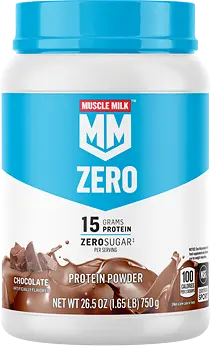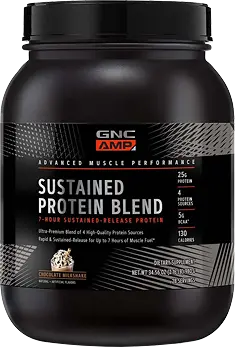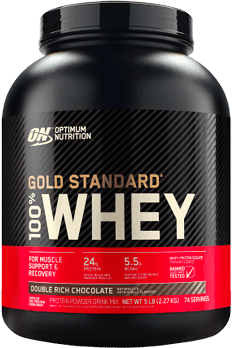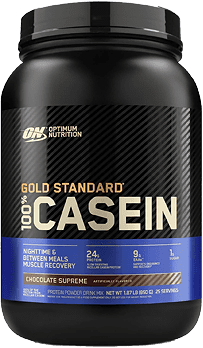Our ReviewMuscle MilkZero

Muscle Milk Zero is a protein supplement tailored for those looking to increase their daily protein intake while keeping calories in check. Each 30g serving provides 15g of protein from a blend of fast-digesting whey protein isolate and slower-absorbing sources like calcium caseinate and milk protein isolate. With 9g of carbohydrates and 2g of fat per serving, it’s better suited for users focused on protein recovery rather than strict carb limitation. Formulated to support muscle maintenance and post-workout recovery, it also includes a variety of essential vitamins and minerals—such as calcium, magnesium, and vitamin D—making it a balanced option for everyday nutrition. It works well as a versatile shake between meals or after exercise.
Ingredients
Muscle Milk Zero's ingredient profile starts with a mix of slow-digesting casein proteins, which immediately sets it apart from fast-absorbing whey products. Calcium caseinate and sodium caseinate are the primary proteins here, both derived from casein. These proteins are known for their slow absorption, which makes them ideal for times when a sustained release of amino acids is preferred, such as between meals or before bed. They can help keep you full for longer periods and are often favored by those looking to control cravings or manage appetite throughout the day.
Whey protein isolate, though present, takes a back seat in this formulation. While it provides a faster-digesting protein option, the blend is mostly geared toward a slower release. This combination of proteins is well-suited for muscle recovery, as it ensures a steady supply of amino acids over time, supporting muscle repair and growth.
One ingredient worth noting is Isomalto-Oligosaccharides, which ranks second on the ingredient list. While it’s often marketed as a prebiotic fiber, its classification as a carbohydrate source is debated. Some see it as beneficial for gut health due to its potential prebiotic effects, while others are concerned it may act more like a simple carbohydrate, contributing to the product's 9g of carbs per serving. The fact that the product contains no sugar is certainly a plus, but for those tracking carbs, this ingredient could be a point of consideration.
The non-dairy creamer includes sunflower oil, maltodextrin, and sodium caseinate. Sunflower oil is a healthier fat choice, but it adds extra fat content. Maltodextrin, a processed carbohydrate, can raise concerns for those watching their carb intake since it may spike blood sugar levels.
Minerals such as magnesium phosphate, calcium phosphate, and potassium chloride serve dual purposes in the product. They act as stabilizers and enhance the product's nutritional profile by contributing essential minerals like magnesium, calcium, and potassium, all of which are crucial for muscle function and recovery.
Thickeners like cellulose gum, xanthan gum, and carrageenan contribute to the smooth and thick consistency. While xanthan gum and cellulose gum are generally considered safe, carrageenan is somewhat controversial, with some evidence suggesting it may cause digestive discomfort for certain individuals. This could be of concern for those with sensitive stomachs.
Medium Chain Triglycerides (MCTs) are also present, albeit in small amounts. MCTs are a source of quick energy, often sought by athletes or individuals following a high-fat, low-carb diet.
Finally, the added vitamins (A, D, C) and minerals like calcium, magnesium, and potassium boost the overall nutritional value of the product, making it suitable for those who are active and may need more micronutrients to support muscle function and general health.
While Muscle Milk Zero does a good job of providing functional ingredients for sustained protein release and overall nutrition, some may find the inclusion of artificial sweeteners, thickening agents, and debatable carb sources less appealing. There’s room for improvement, particularly by offering cleaner ingredients, but it effectively serves its intended purpose of sustained protein release.
Effectiveness
Muscle Milk Zero Chocolate is designed to deliver a sustained source of protein, primarily from its casein-based proteins. The combination of calcium caseinate and sodium caseinate makes this product particularly effective for those seeking a slow-digesting protein, ideal for periods of fasting, between meals, or even before bed. Casein proteins are known to form a gel-like substance in the stomach, which slows down digestion, providing a steady stream of amino acids to the muscles over time. This feature is particularly useful for maintaining muscle mass and preventing muscle breakdown, especially in individuals who may not have consistent access to protein throughout the day.
The presence of a small amount of whey protein isolate complements the casein proteins by adding a faster-digesting option to the blend. This dual-phase protein release is a beneficial aspect for those looking for both immediate and prolonged amino acid delivery. While the protein content per serving is somewhat moderate at 15g, it still provides a sufficient amount for light recovery, particularly for those not needing a high-protein shake post-workout.
In terms of overall effectiveness, the 100 calories per serving with 9g of carbohydrates and 2g of fat positions this product as a middle-ground option. It’s not low-carb enough for keto users, nor high-protein enough for serious recovery. However, it can be quite effective for general fitness enthusiasts who need an easy, balanced source of protein without excessive caloric intake for between meals.
The inclusion of Isomalto-Oligosaccharides (IMO), while considered as a prebiotic fiber, does contribute to the carb count. The debate about whether IMO acts more like a fiber or a simple carbohydrate could affect how different users perceive the product’s carb content, which may influence its effectiveness for those closely monitoring their macros. Moreover, while IMOs are often associated with a low glycemic index, recent studies indicate they may raise blood sugar more than initially thought, challenging their position as a truly low-carb or low-GI ingredient.
In the context of Muscle Milk Zero, IMOs contribute to the product’s more hefty 9g of carbohydrates per serving, raising questions for those mindful of their carb intake. For some consumers, this may be a point of concern, even though the product contains no sugar. Ultimately, while IMOs might offer some gut health benefits, the mixed research on their digestibility and glycemic impact is worth noting for those evaluating their carb consumption closely.
The added vitamins and minerals—such as calcium, magnesium, and vitamin D—are a welcome bonus. These nutrients play critical roles in muscle function and bone health, making the product more than just a protein source but also a supportive nutritional supplement. For active individuals, these added nutrients enhance the product's effectiveness by addressing common deficiencies that can arise from rigorous training or insufficient dietary intake.
Overall, Muscle Milk Zero is effective in delivering a steady stream of amino acids over a prolonged period, making it suitable for muscle maintenance and recovery. However, the moderate protein content and the carb count—largely influenced by IMO—may limit its appeal for those with more specific macronutrient needs. We believe this product is best suited for active individuals seeking to supplement their protein intake between meals and workouts, while also benefiting from a quality isolate for targeted recovery immediately after exercise.
Taste
Muscle Milk Zero in Chocolate is smooth and fairly mild, striking a nice balance between being sweet enough to enjoy but not overpowering. It offers a satisfying chocolate flavor, though lacks some depth of flavor found in some other products. For those who prefer a more subtle chocolate taste, this will likely be a plus. However, for those who prefer a stronger, more indulgent chocolate flavor, it might fall a bit flat. Unfortunately, the inclusion of artificial sweeteners does leave a slightly noticeable aftertaste, especially if you are sensitive to artificial sweeteners. It's not a deal breaker for us, but something to keep in mind if you find artificial sweeteners less palatable.
In terms of texture, the shake mixes up surprisingly thick and creamy, especially when using milk. The casein proteins give it that extra body, making it feel like more of a meal than just a drink, which can be a nice feature if you're using it between meals to keep you full. Even with water, the texture is still smooth and far from watery. For that reason, you may want to dilute with a little more liquid to find your sweet spot in terms of texture.
As far as mixability goes, Muscle Milk Zero Chocolate performs reasonably well. As expected from a casein powder, it does take a little more work to get a clump-free result. We recommend using a blender where available but it will blend well in a good shaker bottle without too much effort.
Value
When evaluating the value of Muscle Milk Zero, it falls somewhere between mid-range and budget protein powders. At its core, this product is designed to deliver a slow-digesting protein source with added nutritional benefits, but its relatively moderate protein content—15g per serving—limits its appeal for those looking for a higher protein yield. Compared to other protein powders in its class, Muscle Milk Zero offers a balanced option with a moderate calorie count and a focus on satiety through its casein proteins, but it may not deliver the same level of value for those seeking pure protein density in every scoop.
The blend of calcium caseinate and sodium caseinate is beneficial for individuals who want sustained muscle recovery, and that’s where the value lies for someone looking to control appetite between meals or have a slower digesting protein option. However, when stacked up against whey isolates or pure protein supplements, Muscle Milk Zero’s protein-to-calorie ratio is less efficient. At 15g of protein per 100 calories, other products that offer closer to 20-25g of protein in the same calorie range will seem like a better deal for users with higher protein needs.
From an ingredient quality perspective, Muscle Milk Zero does a good job of including vitamins and minerals like calcium, magnesium, and vitamin D, which adds nutritional value that some other products don’t offer. That said, the use of artificial sweeteners and flavorings could be a downside for those who prioritize cleaner, more natural ingredient lists. Compared to other casein-based or zero-sugar products, its inclusion of these artificial components could detract from its perceived value for health-conscious buyers.
When compared to pure whey isolate or concentrate products, the casein-dominant blend positions Muscle Milk Zero more as a specialized product than a versatile, all-around protein powder. Its primary use case is for those who benefit from the slow-release properties of casein, and it’s more suitable for a between-meals shake or a nighttime protein option than for immediate post-workout recovery, where faster-absorbing whey is preferred.
Ultimately, Muscle Milk Zero may not be the best choice for those seeking the highest protein content per serving, especially at its price point, which puts it in competition with more protein-dense supplements. However, for someone focused on slow-digesting proteins and added micronutrients, the value proposition improves. It offers a decent amount of protein in a low-calorie, zero-sugar format, making it a reasonable option for those looking for a protein supplement to help with long-term satiety and overall nutrition.
Conclusion
Muscle Milk Zero provides a balanced option for those seeking a low-calorie, slow-digesting protein supplement with added nutritional benefits. Its casein-based protein blend is particularly effective for sustained muscle recovery and controlling hunger between meals. The product’s moderate protein content (15g per serving) may not be ideal for users with higher protein demands, especially when compared to other options offering more protein per calorie. However, its inclusion of vitamins and minerals like calcium and vitamin D sets it apart from other basic protein powders.
For those prioritizing satiety and a slow release of protein, this product is a solid choice. It's especially useful as a between-meal supplement or for nighttime use. However, individuals focused on immediate post-workout recovery or higher protein per serving may find better options. The artificial sweeteners and somewhat debated carb content could be drawbacks, but for its intended use, Muscle Milk Zero offers decent value in the mid-range category.

Where to buy?

The protein matrix includes the primary protein components included in this product. These protein sources are listed in order of volume from greatest to least in the product.
This diagram provides the digestion profile for the protein types contained within this product. The chart plots the digestion of the included protein types over an hourly timeframe. All profiles have their advantages depending on your goals. More information regarding digestion and timing can be found in our guides.
The cost indicators provide a relative cost comparison with all protein products. The lower the score the better!
The "Product Cost Indicator" provides the comparative product cost, as a whole.
The "Protein Cost Indicator" provides a comparative cost based on only the protein component. While this can be useful for comparing products excluding fillers, many additional ingredients can provide additional benefits and value.
Note: Products that serve a dual purpose, such as mass gainers and ketogenic powders don't include the "Protein Cost Indicator".
We are a participant in the Amazon Services LLC Associates Program, an affiliate advertising program designed to provide a means for us to earn fees by linking to Amazon.com and affiliated sites.


